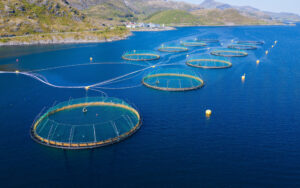
Earlier this week, I described a new Netflix documentary purporting to compare the benefits of healthy omnivore versus vegan diets. In that post, I questioned the adherence of the series to the scientific study it’s describes as being based on, and I asked, “Who \ordered this banquet?”
Well, funding for You Are What You Eat was provided by the Vogt Foundation, which, according to Charley Vogt, its secretary-treasurer, funds “organizations that protect animals and promote plant-based products.” Well, we have gotten plenty of pitches for plant-based products, often by brand name.
The Vogt Foundation also funds the Oceanic Preservation Society, which apparently includes investment by Kyle Vogt in Wild Type—a cellular agricultural start up that recently launched “sushi-grade” cell-based salmon. Kyle Vogt also is Executive Producer of the Netflix documentary.
We do not hear about the Wild Type startup or the sushi-grade salmon. But boy, do we get an earful on farmed salmon. Many presentations begin with the twin pairs talking about their diet menu and its components. One discussion is with Don Staniford, who founded Scottish Salmon Watch to campaign for the end of salmon farming in Scotland. He has carried out covert filming operations to highlight what he regards as mistreatment of the fish and environmental damage.

On a trip to the fish market, and with shots of salmon farms, he asserts that the safety and benefits of farmed salmon is “complete and utter bollocks.” He will reveal “the full horror behind salmon farming” and its products that you should “avoid like the plague.” We do not hear statistics, but general warnings about parasites, viruses, and bacteria. And a dye added to the fish that is linked to human health problems. And seemingly without context or assertion, he will drop, “and there is diabetes.”
So, don’t think you can become a pescatarian instead of a vegan. Unless you can afford wild salmon? Well, not really, the pollution from salmon farming and other sources is alleged to be infecting wild salmon, too.
And what about dairy? We are told that cheese is addictive and asked to consider this wonderful alternative- a pitch for cheese made from cashews. We begin with statistics on American consumption of pizza with plant-based mozzarella cheese. One of the firms profiled has made pizzas using this cheese- “brilliant out of the box thinking,” says the narrator. And now, at the World Pizza Expo in Las Vegas, we get testimonies from passersby who taste the pizza. They love it.
In other running commentary, two celebrated chefs testify that they woke to the health and climate drawbacks of meat, and now, despite threats and warnings, run a successful vegan restaurant in Manhattan, Eleven Madison Park. We return there in show after show to see a lot of appetizing plates.
A “born-again” cattle farmer from Texas that we met earlier visits the restaurant and reports it is a transcendent experience. In the final episode, we attend the awarding of three Michelin stars to the restaurant.
Now back to the original premise. Where are those results of the Stanford twin study? We finally arrive at the fourth and final episode of the series. The most notable result is those on the vegan diet ended with a lower (i.e., more healthful) score on LDL-C), the so-called bad cholesterol. For the omnivore group, their LDL-C levels barely budged, ending on average at 116.1 milligrams per deciliter, above the optimal maximum of 100mg/dc. For twins on the vegan diet, there was an average 13 percent decrease to 96.5 mg/dl. That is potentially important for cardiovascular and other health issues.
But this “prime” result of the study, it appears, could have been taken for granted. It is well-established. In fact, none of the outcomes of the study apparently are surprising. Walter Willet, a professor of epidemiology and nutrition at the Harvard School of Public Health, commented to VOX, “There is no body of evidence that conflicts with the finding that a healthy plant-based, vegan diet as implemented in this study is better than a typical omnivore diet.”
If in fact these results are nothing new, what then was the intention of the Stanford study? Given the timing of the release of the documentary series on January 1, 2024–just two months after publication of the study results–it must have been developed and filmed as the study was underway. Would that have been the case, given the sponsors of the documentary, if there had been any chance the study’s results would not be “pro-vegan”? Just asking.
My intention here is not to make the case against climate alarmism (although I have done so elsewhere), nor to defend the animal husbandry industry against multiple attacks, and certainly not to evaluate the benefits of meat substitutes.
My point is that a competent (though apparently not very new) scientific study, which itself may have been designed mostly to promote veganism, became the platform for blatant propaganda. The bait-and-switch tactics draw in audiences seeking to be informed by science about their health and instead get lectures motivated by ideology—a ploy that is getting old.
With that disclaimer, let me comment briefly on two of the most egregious rants that for my own interest I followed up with a little research.
First, on the “horrors” of farmed salmon, Harvard Health Publishing of the Harvard Medical School examined the entire issue and concludes:
Second, on the threat to global climate from the emissions of cattle, the CLEAR Center for Clarity and Leadership for Environmental Awareness and Research at the University of California, Davis, makes a very revealing point. Yes, gas emitted by cattle is methane, which is a 28 times more potent greenhouse gas than CO2. But CO2 persists in the atmosphere for hundreds or thousands of years, whereas methane degrades almost entirely in about 12 years. This methane is made in the stomachs of ruminants from CO2 drawn from the atmosphere by plant photosynthesis, which creates cellulose in the plants upon which cattle feed. Their digestive systems convert the cellulose into methane, which they emit. Methane is emitted, degraded away, and emitted again in an repetitive cycle called atmospheric gas flow- a constant wash.
In my view, You Are What You Eat: A Twin Study exploits a scientific study to attract an audience for indoctrination. I add the footnote that two of the chief such pitches also appear to be easily debunked by science.
Walter Donway is an author and writer with more than a dozen books available on Amazon and an editor of the e-zine Savvy Street. He was program officer or director at two leading New York City foundations in the healthcare field: The Commonwealth Fund and the Dana Foundation. He has published almost two dozen articles in the Blockchain Healthcare Review.

READER COMMENTS
Dylan
Mar 28 2024 at 5:14pm
I have not read the links yet, but I was under the impression that the climate impact from cattle was primarily due to pasture used for grazing in what is assumed would otherwise be undeveloped land that would be a carbon sink?
Walter Donway
Mar 31 2024 at 11:27am
Thanks for commenting. I did mention in part 1 of the article, but briefly, that the documentary kept flashing to the rain forest and trees crashing down to clear land for profitable cattle grazing. But more emphasis was on cattle on U.S. ranches emitting stomach gases from both ends.
The documentary unquestionably tried to link a non-vegan diet to the purported climate crisis. And so, the vegan cause gets linked with the climate-alarmism cause gets linked with the farming-as-animal-cruelty cause gets linked with the over-fishing cause… Not direct link made as yet to Gaza.
steve
Mar 29 2024 at 2:02pm
I usually use farmed salmon when I smoke it. It seems fattier and holds up well to the prolonged smoking (hot smoke). Also buy farmed salmon when we are cooking it for church as 10 pounds of farmed salmon is much cheaper. However, at home if grilling or otherwise we avoid farmed. (For those who like Asian food salmon works really well for three flavored fish.) However, I dont worry at all about the health differences.
Steve
Walter Donway
Mar 31 2024 at 11:39am
Thanks for commenting. Behind all this, and driving it and informing it, is the awesome influence of the 18th-century French philosophe, Jean-Jacques Rousseau, who argued that almost anything that removed man from his natural, primitive, happy state represented degradation, conflict, and alienation.
One difference, today, it seems, is that the emphasis is upon degradation and destruction of nature, with less emphasis on the debasement of humanity. But both represented Rousseau’s great attack on the ideas and ideals of the Age of Enlightenment.
His concern with humanity was highly theoretical; he had four children with a cleaning lady, all of whom he put as infants into a Paris orphanage, where, in that era, they were overwhelmingly likely to die. He was too busy explaining how to save humanity.
I devote a chapter to Rousseau is a new book based on essays I published here.
David de Hilster
Apr 1 2024 at 3:11pm
You at least said “In my view”. I suggest people look at http://nutritionfacts.org. Also, the American Heart Association’s job is not to cure the problem, but to treat it. Their “heart healthy” recommendations are skewed to include many food products that support their research. Same problem with these recommendations: follow the money. The good news is that no matter how much flack whole plant-based diets get, the results are real and no one can force us to put unhealthy stuff into our mouths. And we have the ability to research all this on our own and relying on studies and recommendations by organizations whose goal is to “live with” chronic disease, they won’t be recommending a whole plant-based diet someday soon.
Anders
Apr 4 2024 at 12:13pm
Four things puzzle me.
First, selection bias and causation. Are not people who are vegan or who care about their diet in general likely to eat better, exercise, and live comfortable lives as well? How do we avoid comparing those with excessive carnivores living on hyperprocessed foods? And given that only 10% or so of a healthy carnivorous diet is meat, and even less red meat, how can we assume that is a driving factor?
Second, the evidence is overwhelming that diet does indeed matter, but that the optimal diet can vary substantially based on genetic factors alone and beyond. Genome sequencing, sensors, and digital entrepreneurship should soon allow such bespoke diets to be easily available at minimal cost. Does that not matter more?
Third, while I do sympathise with the moral arguments (though not clear whether it is better those cows are not born at all), by any logic they cannot have anything to do with the health effects.
Fourth, why farmed salmon as a problem? Overfishing is a huge problem and a posterchild example of the tragedy of the commons that deserves much more attention. Aquaculture is part of the solution, and farmed salmon, a result of much vaunted Chilean industrial policy, has made salmon affordable to much of the world. The problems are being ironed out with innovation. And if someone eats meat, is fish not by far the healthiest option?
It seems like they are taking valid points and blowing them up to go on a shaming crusade funded by unabashed cronyist interests. Reminds me of a claim someone made about how renewables are dirt cheap and all we need, linking to uncontrovertible evidence outlined in a report funded by a body that actually called itself the renewable energies interests group…
Am I missing something?
Comments are closed.